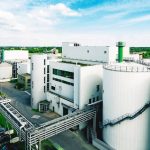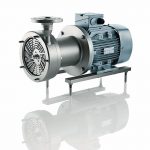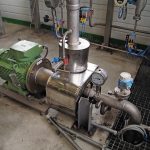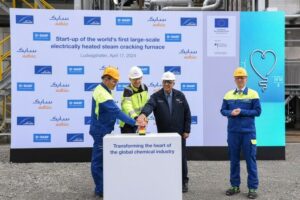Plant oils – the basic materials in biodiesel production – are processed in several steps. A process known as transesterification presents a particular challenge for the pumps and homogenisers which are used for this purpose. The intermediate products processed at this stage are extremely aggressive and corrode even high-strength elastomers. Glencore Magdeburg therefore decided to acquire Fristam shear pumps in the FSM series with sealless magnetic couplings as part of an investment programme to extend its production facilities and optimise its processes.
Glencore relies on shear pumps with sealless magnetic couplings
Efficient plants for biodiesel production
Plant oils – the basic materials in biodiesel production – are processed in several steps. A process known as transesterification presents a particular challenge for the pumps and homogenisers which are used for this purpose. The intermediate products processed at this stage are extremely aggressive and corrode even high-strength elastomers. Glencore Magdeburg therefore decided to acquire Fristam shear pumps in the FSM series with sealless magnetic couplings as part of an investment programme to extend its production facilities and optimise its processes.
According to figures published by the relevant industry association, roughly three million tons of biodiesel were manufactured in Germany in 2014. This equates to approximately 6 % of the German diesel fuel market. In 2012, Glencore Magdeburg invested about 70 million euros in extending its production facilities and has since ranked among the larg-est producers nationwide, with an output of more than 250,000 tons of biodiesel per annum. At its Magdeburg facility, the company processes some 2000 tons of oilseed rape daily, corresponding to an annual capacity of more than 700,000 tons. Biodiesel is one of several products manufactured using oil extracted from the rapeseed plant. Against this background Veit Osterburg, the company’s Chief Technical Officer, explains: “Sustainability is a vital aspect for us. We believe in fuels from renewable resources, which is why we invested in the expansion of our production capacity. Germany is a pioneer in this area.” The production process for biodiesel is basically as follows: first, the rapeseeds are ground and pressed in an oil mill. Oilseed cake which is sold as fodder is manufactured there in addition to rapeseed oil. The latter is subsequently transformed into biodiesel by transesterification. The crude glycerine separated from it is distilled into pharmaceutical glycerine and used in the food and pharmaceutical industries.
Mature industrial production process
Chemical transesterification is a vital process step on the way from rapeseed oil to biodiesel. At this stage, about 10 % methanol and catalysts are added to the plant oil to reduce the product’s viscosity. The properties of the rapeseed oil are simultaneously adapted to those of conventional diesel fuel. Mainly potassium or sodium hydroxide salts are used as catalysts. When mixed with water, these become alkaline solutions, which are then split into fatty acids and glycerine by electrolysis. The fatty acids react with the methanol while the glycerine is separated. Finally, inorganic acids are added in order to transform the catalysts into slightly soluble salts and separate them once more. Since the pumping media utilised for biodiesel production are often extremely aggressive, hermetic sealing of the pumps is a must to prevent unscheduled downtime due to leakage or product spillage. If leakage occurs, even elastomers made of Kalrez or PTFE-Kalrez are not sufficiently resistant. As a result, biodiesel may penetrate into the sealing liquid chamber of the mechanical seal and thus also into the sealing liquid container. The liquid then gradually bonds with the biodiesel, forming a pasty substance, so that it is no longer able to circulate. In order to further increase the equipment’s efficiency, the production cycles must be lengthened as far as possible.
Resistant to aggressive media
When it comes to multiphase blends, Fristam shear pumps have been used extremely successfully for some time now to blend powders with liquids. This applies both to tasks in the food and beverage industry and to biodiesel production. The design of these rotary homogenisers is based on the proven FP series of centrifugal pumps. Instead of an open impeller, shear pumps have an interlocking rotor-stator combination. To create the blending effect, inhomogeneous products are sucked through a shear gap no more than 0.5 mm in size at extremely high tip speeds of up to 38 m/s. Owing to the special conditions prevailing in industrial biodiesel production, in particular explosion protection requirements and the transport and homogenisation of aggressive media, Fristam equipped the shear pumps for Glencore’s Magdeburg facility with a magnetic coupling and completely dispensed with rotating sealing systems. The product compartment is hermetically sealed from the environment by a separating can while the mixing unit inside the pump head has a contactless, slip-free connection to the drive unit via the magnetic coupling – a design principle that is both safe and efficient. Osterburg is delighted with the success of the Fristam project: “We use the shear pumps in the transesterification process to blend inorganic acids into the catalyst and have obtained optimal results in terms of uptime and overall performance. The alternative solution of a me-chanical seal combined with a pressurisation system and appropriate IC technology would have been risky and considerably more expensive.”
Perfect blends in reproducible quality
Fristam shear pumps deliver absolutely homogeneous finished products and stable emulsions. They prevent the formation of lumps and agglomerates and yield consistent, reproducible results. The forced guidance of the product through the rotor-stator unit ensures that the entire batch is homogenised. Compared to conventional dissolution of substances in large tanks or boilers, significant time savings are realised thanks to the FSM shear pumps. Specific variations in the consistency and texture of the sheared products can be achieved using a frequency converter. Five sizes are available with shear rates up to 125,000 1/s. Osterburg sums up: “The complete package consisting of excellent technology, a design geared to the application and intensive cooperation has prompted us to order three more shear pumps from Fristam, to be installed in summer 2015.”
www.cpp-net.com search: cpp0315fristam
Andreas Kohlhaus
Andreas Kohlhaus
Vertrieb Prozesspumpen,Fristam Pumpen
Share:









